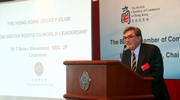Although the iconic status of horse racing in Hong Kong owes its roots to the early British settlers' passion for the sport, The Hong Kong Jockey Club is today "a thoroughly international organisation in every respect," Club Chairman T Brian Stevenson told members of the British Chamber of Commerce today (17 November) at a lunchtime presentation in the Chamber's 'Captains of Industry' series.
"I am actually the first British Chairman since 1993, while our Chief Executive is German, our Director of Racing is American, and our jockeys and trainers cover some 10 different nationalities," he observed. "And to ensure that we can offer truly world-class products and services, we recruit the best talent from wherever we can find it, with of course the emphasis always on Hong Kong.
Mr Stevenson also noted that Hong Kong had a record 19 locally-trained horses listed in the World Thoroughbred Racehorse Rankings for 2010, and that the Cathay Pacific Hong Kong International Races in December had become recognised as the "Turf World Championships", attracting a Who's Who of the sport's leading horses, jockeys and trainers each year from around the globe.
"Yet despite the Club's very global outlook today, our roots remain firmly entrenched in Hong Kong, and our overriding mission is still serving the local community as a provider of sporting entertainment and major charitable benefactor," he said.
"In terms of our not-for profit business model, under which we provide a legal and regulated channel to meet the public demand for gambling, then use the proceeds of that for the betterment of the community, we are unique in the world. It's a model that is widely admired, indeed envied, in many other places worldwide."
Over the years, Mr Stevenson observed, "this very neat and brilliant formula has enabled the Club to play a significant role in helping build the Hong Kong community that we are all privileged to enjoy today".
The Club's successful horse racing, betting and Mark Six operations converted to over HK$15 billion a year for public funds through betting duties and taxes, he said, equating to around 7.3% of all taxes collected by the Inland Revenue Department. "Just imagine the impact on salaries and profits tax if these payments were materially reduced."
Most significant of all, Mr Stevenson said, was that on top of its many contributions to the economy and the public purse, the Jockey Club donated significant elements of its surpluses each year to charitable and community projects. Last year these donations reached a record HK$1.62 billion.
As a not-for-profit organisation, the Club was probably the only non-government body that could take on projects of such scale as Ocean Park, the Hong Kong University of Science and Technology, Hong Kong's staging of the Beijing Olympics equestrian events, and the conservation and revitalisation of the Central Police Station Compound.
"We recognise the huge responsibility this entails," Mr Stevenson stressed. "But equally important to us are the dozens of smaller community projects we support every year in areas like community services, healthcare, education and recreation. The HK$1.62 billion we donated last year will support 114 projects of different types and sizes, reaching out to an estimated five million people between them, or some 70% of all Hong Kong citizens."
However, he cautioned, the Club faced significant challenges on two fronts, namely changing demographics and lifestyles, and the competitive challenge from illegal and offshore operators.
Regarding the former, the Club had invested heavily in measures to attract new customers to the sport, retain existing loyal fans, and make a visit to the racecourse a truly world-class entertainment experience. This included a keen emphasis on greater use of technology through wi-fi, iPhone apps and the like, initiatives that had been positively received.
As regards competitive threats, Mr Stevenson said, "we are being asked to fend-off ever-growing global competition with one hand tied behind our backs". The Club was not complaining about competition, he stressed, but was simply asking for the opportunity to compete effectively with the new regional, offshore and online operators.
"A key issue here is taxation. Quite simply, Hong Kong's betting duty rates on horse racing, at up to 75%, are the highest in the world – five times more than Britain's 15%. Many overseas countries have recognised that lowering tax rates can be beneficial to the industry's development in the long term, but here we seem to be stuck in a time warp, and are missing the opportunities arising from the changing environment."
Another area where Hong Kong had a huge but unrealised opportunity, he said, was commingling – the system whereby bets from an overseas country are merged into the pool of the jurisdiction running the race to create a larger and more attractive overall pool. "However, the double taxation problem makes Hong Kong’s potential to be a commingling hub financially unviable.
"For the best interests of Hong Kong, I really hope we can tackle these anomalies," Mr Stevenson said. "What I would like to see is Hong Kong building on the world-class reputation and strengths it already has – its not-for-profit business model, its high integrity and its excellent horse racing product – to become a global centre of racing and betting entertainment.
"There is a huge business opportunity here. The door is open and I can assure you from my visits to overseas jurisdictions that they all keenly want to work more closely with us in internationalising the racing industry, which is in the best interests of the sport. We are the key piece but still the missing piece in the jigsaw.
|

Speaking at BritChama£á?s 'Captains of Industry' series lunchtime presentation, Chairman of The Hong Kong Jockey Club T Brian Stevenson says that despite the Club's very global outlook today, its roots remain firmly entrenched in Hong Kong, and its overriding mission is still serving the local community.
|